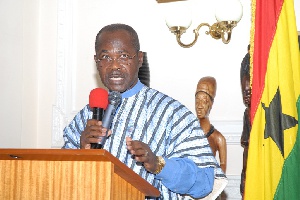Ghana’s High Commissioner to London, Professor Kwaku Danso-Boafo, has said that it is high time the relationship between the developed world and the African continent was redefined from donor and recipient to partners in development.
He was presenting a paper on “UK-Africa Relations: Reflections on the Role of African Diplomacy”, in London last Wednesday at Chatham House in London.
The one-day event, which attracted various independent researchers on international affairs, diplomats and special invitees, was chaired by Mr. Alex Vines OBE, Research Director of Area Studies and International Law and Head of Africa Programme, at the Royal Institute of International Affairs, Chatham House.
Prof. Danso-Boafo, who is also accredited to the Republic of Ireland, noted that although Africa would, in the foreseeable future need assistance in the form of aid from the UK, “there has to be a shift in emphasis from aid to trade, and also from assistance to investment”.
He said in Africa, the focus was now on attracting relevant local and foreign direct investment from anywhere in the world, while the continent was increasingly becoming a global investment and trade haven.
Throwing more light on the prospects for inter-governmental co-operation on African and global issues, the High Commissioner said one of Africa’s overlooked resources was the vast sections of its arable land lying fallow.
He pointed out that Africa was estimated to have 60 per cent of the world’s arable land, but only a fraction of it had been cultivated.
“This, therefore, presents a huge opportunity for exploitation by potential investors in agriculture, and in turn improve the lives of locals through the creation of jobs and self-sustaining food source, while opening up trade opportunities as a global food provider”, Prof. Danso-Boafo stated.
He said the huge cost involved in the shipment of tons of food items across the Atlantic to disaster-stricken parts of Africa could then be saved, and instead directed at assisting those countries to be self-sufficient in food production, “adding that it could be done through the provision of the relevant technical know-how and necessary farm implements to ensure year round farming”.
He also touched on the role of diplomatic engagement in informing and strengthening bilateral relations and said the goal of the government had been to fashion its external policy to respond to the rapidly changing internal and external dynamics.
“Against this backdrop, the High Commission has had to move away from traditional pursuits of diplomacy and re-orient its work to focus on trade, investment and economic diplomacy”, he stated.
Prof. Danso-Boafo said that as part of the investment drive, the High Commission recently collaborated with the Nottingham University in launching a programme to assist British companies interested in doing business in Ghana, while the University of Greenwich was also working with Sister Institutions in Ghana and other African countries to improve the livelihoods and incomes of smallholder farmers.
Meanwhile, institutions such as the Liverpool Hope University and Coventry University have established academic scholarships for Ghanaian students, he announced.
On Ghana-UK merchandise trade, Professor Danso-Boafo revealed that since 2009 the trend had been very vibrant with total trade improving over the past five years from the value of £468 million in 2008 to £746 million in 2012, an increase of £278 million representing a rise of almost 60 percent.
SOURCE: Political and Economic Section, Ghana High Commission, London, UK
Diaspora News of Tuesday, 28 January 2014
Source: Ghana High Commission
Ghana high commissioner speaks at chatham house
Entertainment
















